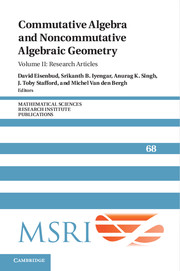Book contents
- Frontmatter
- Contents
- Preface
- When is a squarefree monomial ideal of linear type?
- Modules for elementary abelian groups and hypersurface singularities
- Ideals generated by superstandard tableaux
- Zariski topologies on stratified spectra of quantum algebras
- The derived category of a graded Gorenstein ring
- Singularities with respect to Mather–Jacobian discrepancies
- Reduction numbers and balanced ideals
- Unipotent and Nakayama automorphisms of quantum nilpotent algebras
- Formal fibers of prime ideals in polynomial rings
- Bounding the socles of powers of squarefree monomial ideals
- An intriguing ring structure on the set of d-forms
- On the subadditivity problem for maximal shifts in free resolutions
- The cone of Betti tables over a rational normal curve
- Adjoint associativity: an invitation to algebra in ∞-categories
Reduction numbers and balanced ideals
Published online by Cambridge University Press: 29 May 2025
- Frontmatter
- Contents
- Preface
- When is a squarefree monomial ideal of linear type?
- Modules for elementary abelian groups and hypersurface singularities
- Ideals generated by superstandard tableaux
- Zariski topologies on stratified spectra of quantum algebras
- The derived category of a graded Gorenstein ring
- Singularities with respect to Mather–Jacobian discrepancies
- Reduction numbers and balanced ideals
- Unipotent and Nakayama automorphisms of quantum nilpotent algebras
- Formal fibers of prime ideals in polynomial rings
- Bounding the socles of powers of squarefree monomial ideals
- An intriguing ring structure on the set of d-forms
- On the subadditivity problem for maximal shifts in free resolutions
- The cone of Betti tables over a rational normal curve
- Adjoint associativity: an invitation to algebra in ∞-categories
Summary
Let R be a Noetherian local ring and let I be an ideal in R. The ideal I is called balanced if the colon ideal J : I is independent of the choice of the minimal reduction J of I . Under suitable assumptions, Ulrich showed that I is balanced if and only if the reduction number, r (I ), of I is at most the “expected” one, namely ℓ(I )−ht I +1, where ℓ(I ) is the analytic spread of I . In this article we propose a generalization of balanced. We prove under suitable assumptions that if either R is one-dimensional or the associated graded ring of I is Cohen–Macaulay, then J n+1 : I n is independent of the choice of the minimal reduction J of I if and only if r (I ) ≤ ℓ(I )−ht I +n.
Let R be a Noetherian ring and let I be an ideal in R. The Rees algebra (I ) and the associated graded ring grI (R) of I are
(I ) = R[I t] =I i ti and grI (R) = R[I t]/I R[I t] =I i/I i+1. i≥0 i≥0
The projective spectrums of (I ) and grI (R) are the blowup of Spec(R) along V(I ) and the normal cone of I , respectively. When studying various algebraic properties of these blowups a natural question to consider is which properties of the ring R are transferred to these graded algebras. When R is a local Cohen–Macaulay ring and I an ideal of positive height then if (I ) is Cohen– Macaulay then so is grI (R) [Huneke 1982]. The converse does not hold true in general. A celebrated theorem of Goto and Shimoda illustrates the intricate relationship between the Cohen–Macaulay property of these blowup algebras and the reduction number of I . It states that when (R,m) is a local Cohen–Macaulay ring, with infinite residue field, dimension d > 0, and I an m-primary ideal, then (I ) is Cohen–Macaulay if and only if grI (R) is Cohen–Macaulay and the reduction number of I is at most d − 1 [Goto and Shimoda 1982]. This theorem has inspired the work of many researchers and many generalizations of it appeared in the literature in the late 1980s and early 1990s; see, for example, [Grothe et al. 1984; Huckaba and Huneke 1992; 1993; Goto and Huckaba 1994; Johnston and Katz 1995; Aberbach et al. 1995; Simis et al. 1995].
Information
- Type
- Chapter
- Information
- Commutative Algebra and Noncommutative Algebraic GeometryVolume 2: Research Articles, pp. 169 - 180Publisher: Cambridge University PressPrint publication year: 2015
